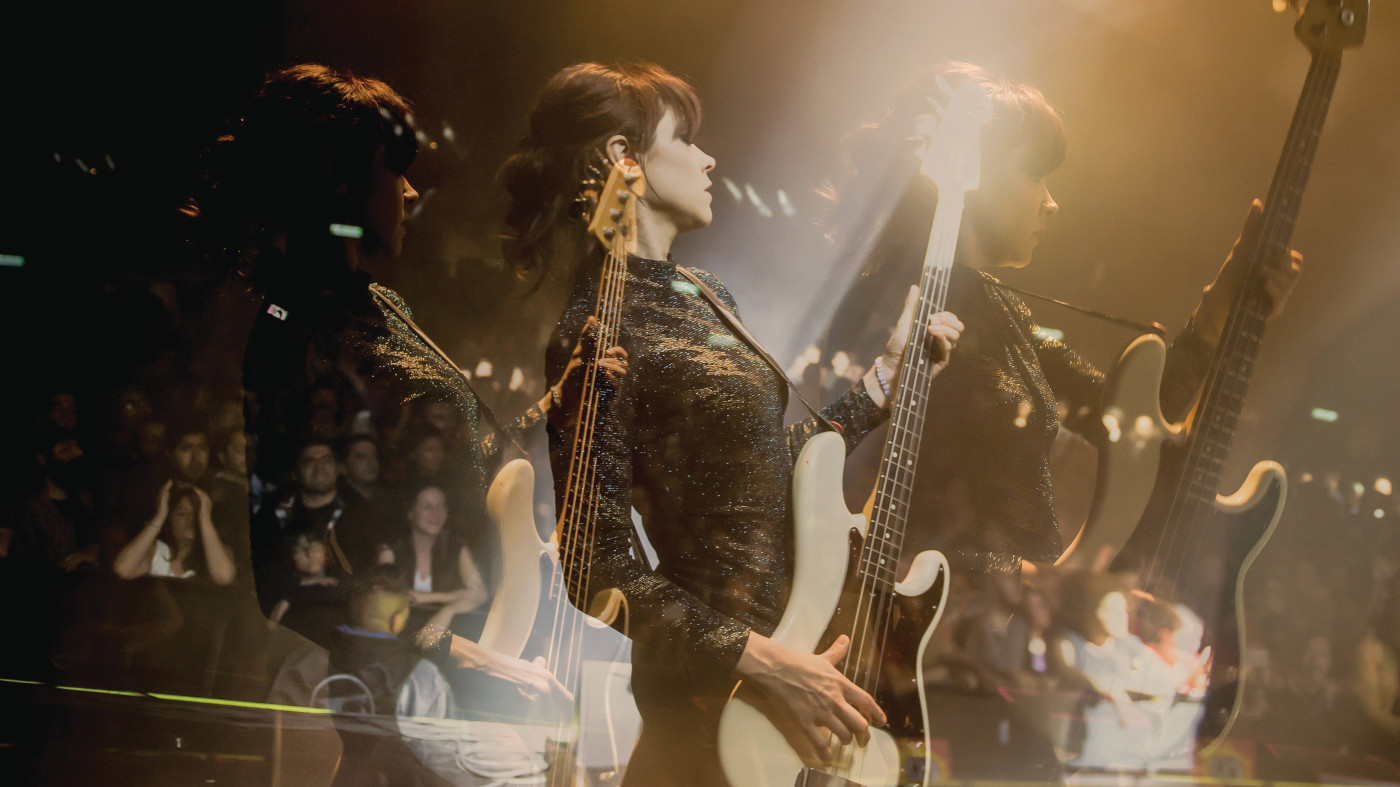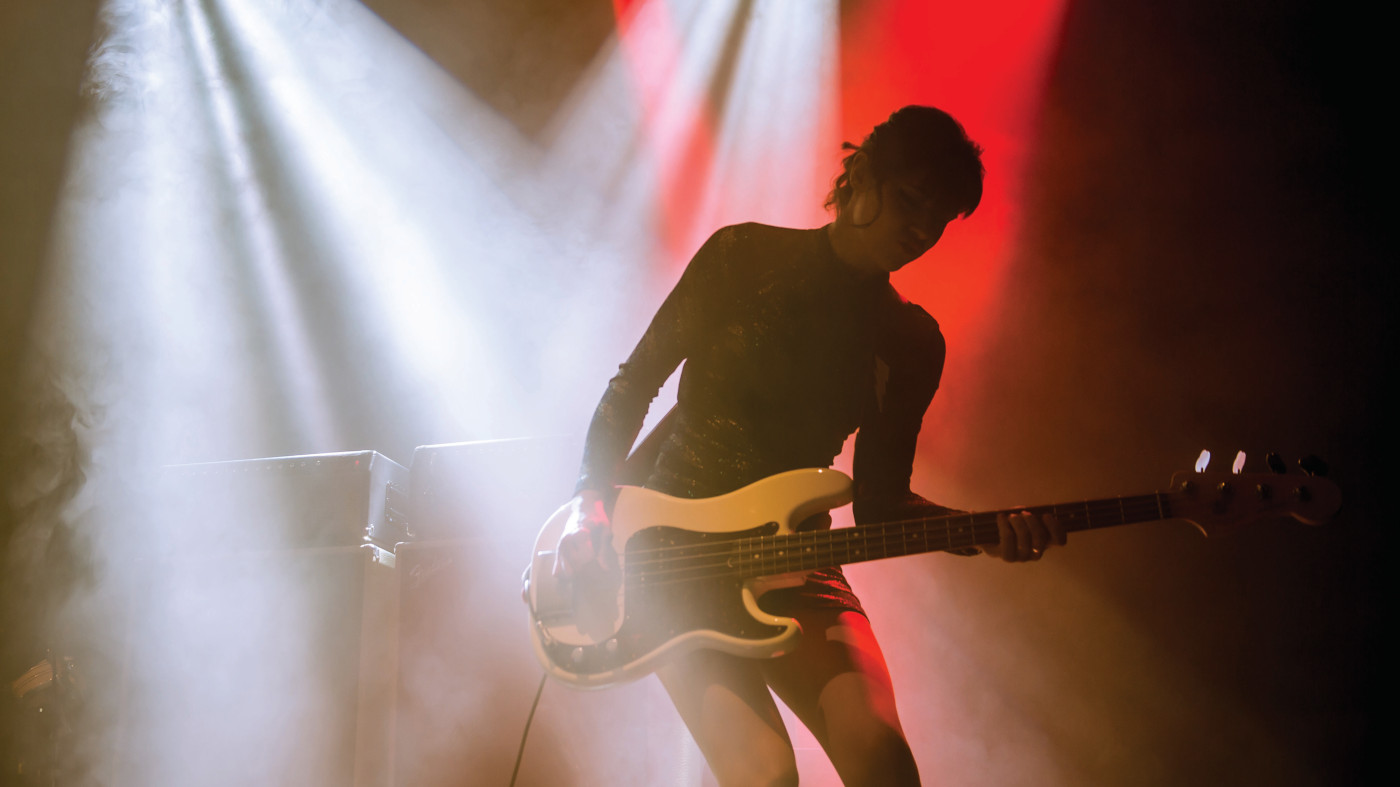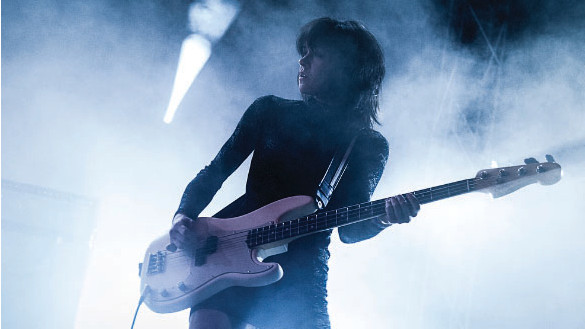Simone Butler (Primal Scream): “My advice? Don’t fear failure - fear regret”
The Primal Scream bassist talks up the Loaded low end

“I’ve played bass for Primal Scream since 2012: the band’s line- up is Bobby Gillespie, Andrew Innes, Darrin Mooney, Martin Duffy and myself. I've played musical instruments since I was young.
“I played violin in orchestras when I got to secondary school, so was playing concerts when I was 12 or 13. My father was a musician during my early years, and I listened to all his vinyl and we used to have little jams together. I always loved rock and roll and wanted to be in a band, and I guess the two fused when I picked up a bass.
“I started learning guitar first, but didn’t really bond with it. I then got into DJ- ing, because I loved putting rhythm and melody together - so when I decided to pick up a bass, I realised it’s exactly that. I love how a bass-line can shape a track.
"I went down to Denmark Street in London, because this was when the music shops there were still thriving - and I went into every shop, looking at every bass. I landed at the Bass Cellar and went home with my first bass and the Motown book, very excited at this new adventure.
I’d never felt that kind of vibration and frequency go through me before, and I just thought, yep, this is for me
“I remember plugging it in at the shop; I’d never felt that kind of vibration and frequency go through me before, and I just thought, yep, this is for me. The bass I went home with that day was a Washburn XB-400 in red, two humbuckers and a rosewood fingerboard.
"It was a pretty good starter bass with no frills. Later I had an active Ibanez SR- 500: I tried everything I could. I actually ended up working in a bass guitar shop so I kept trading up with my wages every few months, part-exchanging basses. I tried a Rickenbacker, which I thought was cool, but it wasn’t quite for me - although they’re undoubtedly beautiful.
“Then this Fender US Deluxe Jazz turned up at the shop second-hand, and I fell in love. Sadly I had to sell it to pay my rent a year or so after that - damn, I’d love to find that again! It was gorgeous, in a maroon colour with a cream pickguard and another rosewood board. Those 90s models had a downsized body and were really cool to play. I then found a pre-Ernie Ball Music Man, which I’ve kept.
Get the MusicRadar Newsletter
Want all the hottest music and gear news, reviews, deals, features and more, direct to your inbox? Sign up here.
“I played everything from that bass shop. Every amp and every bass that came in... I loved it, but I need to reel it in or I will just nerd out forever on different basses, ha ha! I’ve always loved the Fender Precision, though, and so I settled on that. It just feels right for me.
“I’m proud to say I’m endorsed by Fender - I use their basses and amps. I also use Couch straps and have quite a few of them: they’re super durable and comfortable and come in cool designs.
"I use Jim Dunlop picks, and I have to give a shout-out to Earthquaker Devices, who furnished me with lots of excellent, crazy pedals a few years back. I’ve got a bit of a pedal fetish and have a collection of them, but live right now I just use what I need.”

Going low
“I’m a four-string gal. I did play a five-string last year when I worked with the singer Joel Culpepper. He has a real soul, funk and R&B vibe, so obviously that low B was going to make an appearance. It’s cool to go low, and I’m happy to go there when it’s needed because I love low frequencies, but four is my jam. Bill Dickens I am not!
I can play slap, but I don’t. There are players out there who have made it an art form
“I once had a go on an eight-string Rickenbacker, where the thinner string is an octave higher, but of course you could use other tunings. They’re definitely basses for a healthy studio collection - I think John Entwistle and Chris Squire had the first two.
“I can play slap, but I don’t. There are players out there who have made it an art form - Victor Wooten, Larry Graham, Louis Johnson, Ida Nielsen and many more. I’d do it if a track called for it, because it’s nice to have it as a technique as long as you just use it when necessary. Either way it has to be natural - it should be in your essence as a player. It’s more in my essence to play with fingers or pick. You can be funky without slapping.
“I think even if I was in a funk band I’d still play with my fingers, but there’s no way you can’t not have a go at ‘Thank You (Falettin Me Be) Mice Elf Agin’ by Sly & The Family Stone, or ‘Head’ by Prince, y’know? It’s good to have a lot of styles in your bag, as you never know what you may have to pull out - but at the same time its important to play instinctively.
“Obviously every player will have their own approach to bass. For me it’s to feel it, and listen to the drummer. Listen to everyone else in the room, too. Lock into the bass drum like it’s your heartbeat. Remember that space is as important as what you play.
"A song needs to breathe - when you listen to great records everything is in the right place. No-one is overplaying: it all flows, it roars or it rattles. Some of my favourite tracks have the most basic bass-lines, so fight the urge to fill every space with notes, because sometimes less is more.
“Practise both left- and right-hand techniques. There is so much online that you can learn from, and so much information you can access about playing, as well as what gear to use and how to break down your favourite bass-lines. Get outside your comfort zone. Play live as much as possible. Play with conviction. Play for the song rather than for yourself - you can do that in your own time. Enjoy what you play and breathe.”
Precision player
“My favourite bass ever to date is my 1965 Fender Precision. It’s a thing of beauty. I played my early Scream shows with that, and recorded with James Williamson from the Stooges on it too. I don’t tour with it these days, simply because if something happens to it I can’t replace it, even with money. I guess I’m pretty sentimental with basses... or maybe just that one.
“I also found an original 1976 Gibson Thunderbird with chrome humbuckers years ago. My God, it played like a dream - and those basses often don’t, because they’re quite neck-heavy and awkward, unless your leg is half-cocked in the splits and you wear it an inch off the floor.
"I wanted it so badly, but someone had a deposit on it in a shop. I kept going back to see if it had been bought. I love my 1978 Stingray too. The new ones are a different bass altogether. Mine is not quite bassy enough for me, but I love its raucous mids.
My bass heroes? There are so many! James Jamerson, George Porter Junior, Gail Ann Dorsey, Simon Gallup, Robbie Shakespeare, Carol Kaye, Jah Wobble, Rocco Prestia, Dee Dee Ramone, Bruce Foxton, Norman Watt-Roy, Paul Simonon, Larry Graham, Charles Mingus, John Paul Jones, Stanley Clarke, Esperanza Spalding, Bootsy Collins.
“The greatest bass player that ever lived? There are so many greats who are brilliant at what they do, but I’m gonna settle for James Jamerson. You just have to listen to his isolated bass tracks like the one for ‘What’s Going On?’ - and to think it was all with one finger on the right hand. Amazing. His lines were like poetry.”

On the record(s)
“As for albums with great bass tone, this could be an entire article in itself! I have loads, but I’ll pick a few. I love the Meters’ stuff - George Porter Junior’s tone was bold, and clear, so funky and tight, so any of those albums would count. I’d also love to have been in the studio seeing how Prince got different sounds on records, even though some of his earlier stuff is sometimes bass-light. He was and still is a musical hero of mine.
Your feet aren’t meant to touch the seabed all the time - discomfort and uncertainty are learning curves
“Then there’s Funkadelic’s Free Your Mind And Your Ass Will Follow - I mean, Friday Night August 14th - game over! For Sly & The Family Stone, it would probably be There’s A Riot Goin’ On and the Fresh record too. I love the bass on If You Want Me To Stay - you simply can’t listen to that and not want to go and play it afterwards.
"The Clash’s London Calling because it’s such a fierce tone. I’ve met Paul a few times, and he is simply a lovely human being. I love Ronnie Lane’s work with the Small Faces, so I’d add A Nod’s As Good As A Wink.... Then there’s Disintegration by the Cure, purely for Simon’s line on Fascination Street, if anything. He’s the perfect player for that band and always will be.
"I know how Simon gets his tone but it still wouldn’t sound like him. I think tone comes from the player - even if you have all the same gear, it won’t be quite the same, and it shouldn’t be. It should be unique to you. I have a pretty eclectic taste so am influenced from everything from Stax through to Siouxsie & The Banshees.
“My advice? I may be setting myself up to be ridiculed here, but here goes. Don’t fear failure - fear regret. Do that thing you want to do, and don’t stand in your own way. Your feet aren’t meant to touch the seabed all the time - discomfort and uncertainty are learning curves. Time can go quickly, so don’t waste any of it.
“We’re out on summer festivals at the moment and the shows have been great. We’ll be doing our own tour in the autumn and winter - come see us!”


“I’m beyond excited to introduce the next evolution of the MT15”: PRS announces refresh of tube amp lineup with the all-new Archon Classic and a high-gain power-up for the Mark Tremonti lunchbox head
“These guitars travel around the world and they need to be road ready”: Jackson gives Misha Mansoor’s Juggernaut a new lick of paint, an ebony fingerboard and upgrades to stainless steel frets in signature model refresh









